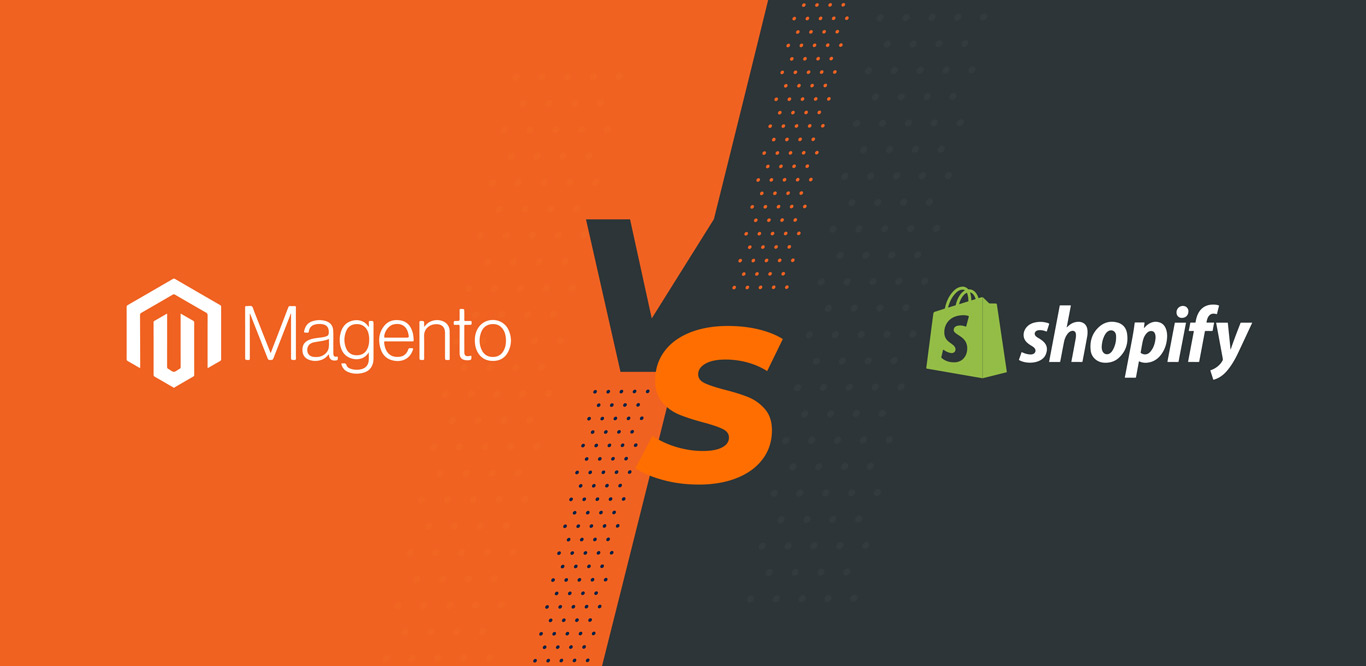
Are you struggling to choose between Shopify and Magento? Don’t worry. You are not alone. Today, both -Shopify and Magento are the most popular eCommerce platforms in the market. Selecting the best and most suitable eCommerce platform for building, maintaining, and managing your online store is a crucial decision as it is responsible for the success or failure of your business.
Shopify is an easy-to-use solution for building online stores. You just need to pay a monthly fee. It can support fledging and expanding business.
Magento on the other hand is an open-source platform (like WordPress) that can be installed on your computer absolutely free. But you need to pay for web hosting, extensions, and security. Magento is a very powerful platform, but if you are a beginner at coding, it might be a challenging task to reach your eCommerce goals. Magento 1 was replaced by a new and enhanced Magento 2 in June 2020 that offers a wide array of features.
How to decide what’s best for your eCommerce store? Check out this ultimate comparison between Shopify and Magento that can simply help you choose the one that best suits your business.
1. Shopify Vs Magento: Pros and Cons
Shopify Pros
- Shopify offers Multichannel Selling where you can simply sell on Facebook, Amazon, Instagram, and eBay.
- It offers 70+ mobile responsive themes amongst which 10 options are available absolutely free. It also offers 64 premium options starting from $140.
- It offers an extensive range of apps in the app store for expanding the functionality of your website.
- It is easy to use with a lot of checkout and payment options.
- It also renders great customer support.
Shopify Cons
- Shopify is the only platform to enforce its own Transaction Fees unless you use Shopify Payments.
- You have to pay for most of the Shopify Themes.
- It is a complex task to integrate apps into your store.
Magento Pros
- Magento has a Large User Community. The Magento Forum is excellent at supporting the users. It also offers support over the phone.
- It is an extremely flexible platform that offers a variety of customization options.
- It offers a variety of features and themes to choose the best for your store.
Magento Cons
- If you are a beginner, it can be challenging to use. You will need to gain coding knowledge, web development jargon, and much more. It is not beginner-friendly.
- It is difficult to install Magento. You need to find a hosting provider that will support Magento. It requires a lot of time for a proper setup.
- There are various costs associated with setting up your store. It might prove to be expensive even though it’s free to install.
2. Ease of Use
Shopify and Magento, both are powerful eCommerce building platforms. Both of them offer a well-designed and thoughtful interface, that simply eases out the process of setting up and running your online store.
Shopify is much easier to use when compared to Magento. Shopify offers an easy drag-and-drop website builder that allows you to simply customize your store by moving elements as per your preferences. Shopify offers a wizard mode that enables beginners to simply set up their stores. Magento doesn’t offer any such feature.
As Magento is not a hosted platform, finding your own hosting and setting up your store with a lot of processes can be a difficult and inconvenient task for the users. Although Shopify is easier to use than Magento. With Magento, you can customize your store as per your preference but with code, which makes it a little tricker.
When I look at the easy-to-use Shopify vs Magento comparison – there is no second thought. Shopify clearly wins!
3. Themes and Design
An attractive and alluring website is more appealing and easy to navigate. The theme of your online store is an important foundation because it’s what your customers will land on.
48% of visitors cite a website’s design as the most important factor in determining a business’s credibility.
Hence, you need to carefully make a choice to lay great first impressions and trust for your customers. Shopify renders 10 free and 64 premium themes that cost between $140 to $180. (much cheaper as compared to Magento). All of their themes are mobile responsive and would look appealing on mobile or tablet. After choosing a Shopify theme, you can simply customize it as per your preferences i.e. adding new pages, sections, changing the color palette, resizing elements, and so on. It can be easily customized without touching a line of code!
Magento renders ready-made themes that don’t need any coding customization and custom themes where you need the assistance of a skilled professional developer. But it offers few options to choose from. In all, there are 16 options for free and paid themes. Amongst them, 10 are mobile responsive. If you want to implement your own theme and designs, you need a skilled developer to do that.
Battleground Winner
Shopify is definitely a better option if you want a wide array of themes to choose from. However, Magento has more powerful features and can be more beneficial if you have the right knowledge to use it.
4. The Cost
Set-Up Fees – While going for Shopify, you don’t have to pay any setup fees. In fact, they offer a 14-day free trial which allows you to test and try out their features and functionality. The question of setup fee doesn’t arise as Magento is totally free to use. (but you need to pay for your own hosting).
Monthly Fees – Shopify offers four different plans ranging from $14 to $179 for monthly fees. Check out their Plans:
- Shopify Lite Plan: $9
- Basic Shopify Plan: $29
- Shopify Plan: $79
- Advanced Shopify Plan: $299
While using Magento, you need to pay for your own hosting which may range anywhere between $5 to $100 on a monthly basis.
Bandwidth Charges – There are no bandwidth charges on any of the Shopify plans. Talking about Magento, the bandwidth charges depend upon the hosting provider you choose for hosting your store. In the battle of bandwidth charges, Shopify is great due to its certainty.
Theme/Template Price – Both Shopify and Magento offer a variety of free and paid themes starting at $80 and $1 respectively.
5. Payment Processors and Transaction Fees
Payment processors allow your store to accept online payments. Both Shopify and Magento render a simple, easy-to-connect payment processor within a few clicks. But which platform offers the best?
Shopify Payments is Shopify’s own payment process and it imposes zero/no transaction fees apart from regular credit card processing fees. Here’s what you need to pay per transaction if you don’t use Shopify Payments:
- Shopify Basic – 2.9% + 30¢ per transaction
- Shopify – 2.6% + 30 ¢ per transaction
- Shopify Advanced – 2.4% + 30¢ per transaction
Shopify supports 100+ different payment gateways. This includes popular payment gateways like Stripe, Amazon Pay, PayPal, and Apple Pay. But you need to pay a transaction fee imposed by Shopify for using these gateways.
Magento supports 150+ payment gateways, but most of them are aimed at large businesses. If you want to integrate common payment processors like Stripe into your store, you need to install them from the marketplace. Magento also enables you to directly sell through Amazon by using your own Magento-based inventory. This allows you to reach more customers.
BattleGround Winner
Magento has definitely won this round. It has better payment processors options as compared to Shopify. Shopify has lesser payment gateway options and it also imposes its own transaction fee unless you use Shopify Payments which can be quite restrictive.
6. Apps and Add-Ons
If any platform’s inbuilt features aren’t enough for your eCommerce requirements, adding an extra feature to your online store is extremely important. Both Magento and Shopify allow you to simply install apps, add extensions, and add-ons. Again, which is the better option?
Shopify’s App Store renders 1200+ apps including free and paid ones targeting various areas like email marketing, social media advertising, shipping, etc. Some of the interesting ones are:
- Trust Hero for abandoned carts
- Mailchimp for email marketing campaigns
- Trackr for sending automatic updates to the customers about their orders
- Analytics Buddy to render useful insights.
Magento has 5000+ extensions and amongst them, 1970 are totally free. 10% of the paid options don’t cost more than 30%. Here are some of our favorite ones:
- Amasty Multiple Coupons to add custom discount coupons and help customers feel valued while encouraging repeat purchases.
- Product Pre-order to automatically send emails to customers for new and exciting product launches.
- Remarkety to integrate email marketing campaigns and social feeds with your online store.
- Banner Slider to add advertising banners with personalized links to create another source of store revenue.
Battleground Winner
Shopify’s app store is easier to use and offers great apps as compared to Magento. Though Magento has more extensions than Shopify, you need an expert with deep coding knowledge to install them.
7. Sales Tools
Sales Tools are important for any eCommerce store. Here are some of the best features on Shopify that allows you to sell products and earn money:
Abandoned Cart Recovery helps you to recover potentially lost sales as it automatically sends emails to customers that left your website before purchasing the products.
Multi-channel selling allows you to sell products on multiple platforms like Amazon, Pinterest, Facebook, Instagram, etc. It also offers partnerships with USPS, DHL Express, Canada Post, and UPS to help you find your own courier service.
Magento also has an impressive inventory system with extensive built-in features like multiple product variants, total revenue reports, total visitor count, and so on. Check out these amazing sales tools it offers:
Like Shopify, it also allows multi-channel selling options. You can install extensions and simply integrate your store with Facebook, eBay, and Instagram.
Battleground Winner
Shopify has a more attractive range of sales tools as compared to Magento. One of the most impressive features is multi-channel selling which is only available in Magento by installing extensions.
8. Marketing Features
Marketing tools help you to reach more and more customers while enhancing your bottom line. Shopify renders excellent marketing tools that enable you to run email campaigns through 3rd Party Integrations. You can directly sell on Facebook, Pinterest, Instagram, etc.
On the other hand, Magento depends on its marketplace for most of its marketing tools. You need to install its extensions for running any campaigns or other marketing strategies. Also, you need to rely on a skilled developer to integrate such marketing tools on a Magento store.
Battleground Winner
Shopify wins this one. Both rely on their respective app markets for their important marketing tools but Shopify allows you to advertise it on social media as a built-in feature.
9. SEO
SEO enables you to accelerate visitor traffic while getting more paying customers and gaining more income.
Magento offers extensive in-built SEO features and renders a variety of SEO guides as well as prompts. You can simply edit image alt tags to help Google understand the category of the image for the image search platform. It also enables you to customize URLs that enable search engines to easily find your web pages.
Shopify is more dependent on other apps for its SEO. You can simply edit page titles and image alt tags, but you need to search the app store for most of the SEO features and functionality.
Battleground Winner
Magento definitely edges Shopify in the SEO round. It has a spectrum of built-in SEO features whereas, with Shopify, you need to search and install apps for various SEO requirements.
10. Support
Fixing issues with your online store can be a headache. The sooner an issue is sorted out, the faster you can get back to marketing, sales, and gaining new customers. Shopify and Magento render a lot of help and support options to help you fix any issues as soon as possible.
Shopify offers 24/7 phone support, 24/7 live chat support, social media support community forum, email support, video tutorials, advanced specialist support, as well as, help centers.
Magento is a community-based platform and offers user guidelines to help you efficiently build your online store. You can also get step-by-step guidance from other Magento developers as well. You don’t have the access to dedicated Magento support but you can simply access SiteGround’s excellent help and support team.
BattleGround Winner
Magento is a clear winner here. It’s aimed at professional web developers and the caliber of its user guides is extremely high. You also have access to SiteGround’s extensive support. On the other hand, Shopify offers customer support options, but it cannot match the level of expertise offered by Magento and SiteGround.
TakeAways
The entire blog is solely focused upon the similarities, differences, features, and functionalities of Shopify and Magento. Now you know exactly which is the best platform for your eStore.
Choose Shopify if,
- You want to quickly set up your online store and get started.
- You are already using an eCommerce website builder and want to switch to something more powerful and efficient.
- You are just starting with eCommerce but want to expand it in the future.
- You want the convenience of an all-in-one payment option and a handy support team.
Go for Magento if,
- You have great coding skills and want to build an online store for a mid-size or large-size business.
- You need entire creative freedom through coding.
- You already have international aspirations or a global audience.
- Your main aim is to build a big brand and earn huge revenue. You must be ready to invest time and money into the design as well.
This is the end of our Royal Shopify Vs Magento Battle. Whichever platform you choose as a winner for your online store, we have an entire team of professionals with in-depth skills and experience who can help you thrive through the entire journey. Talk to Experts.



